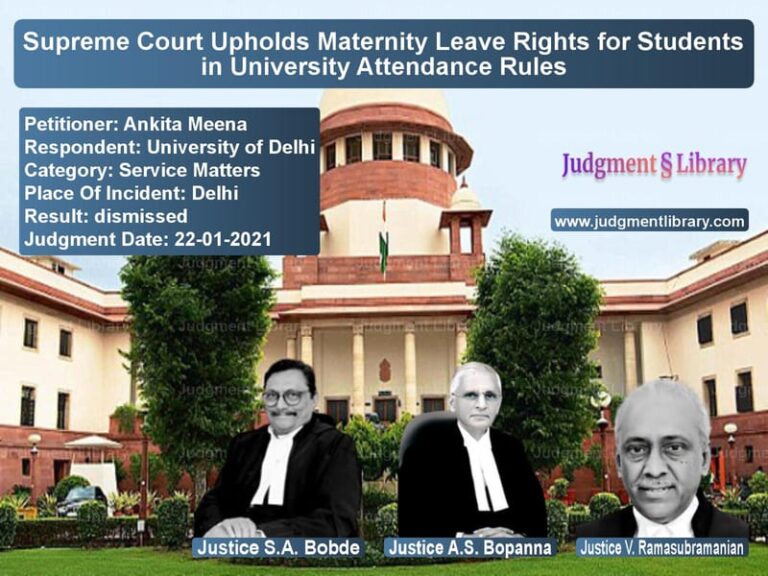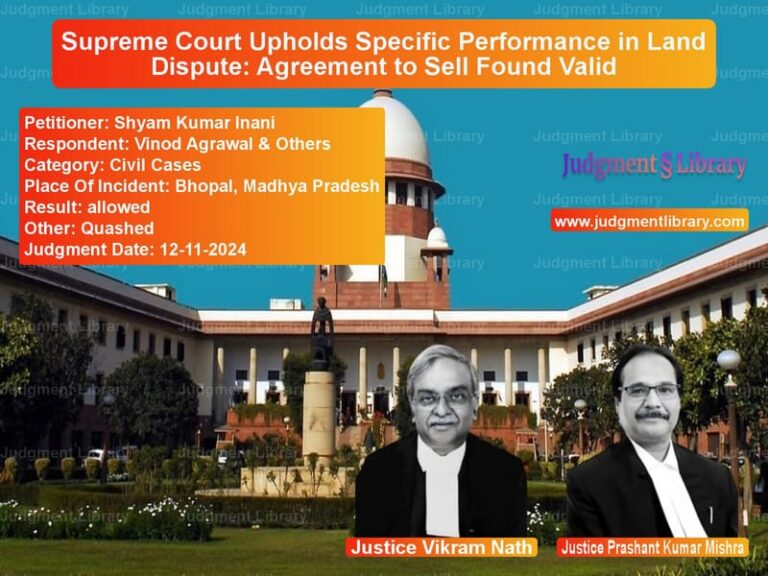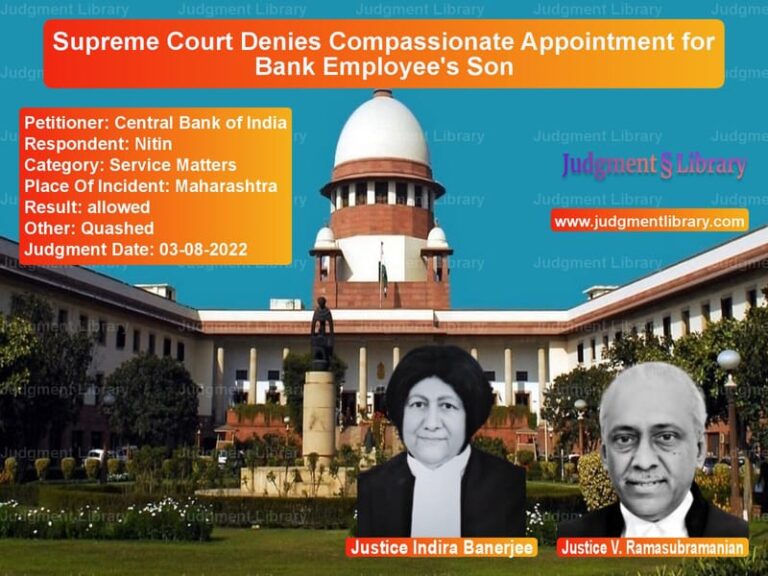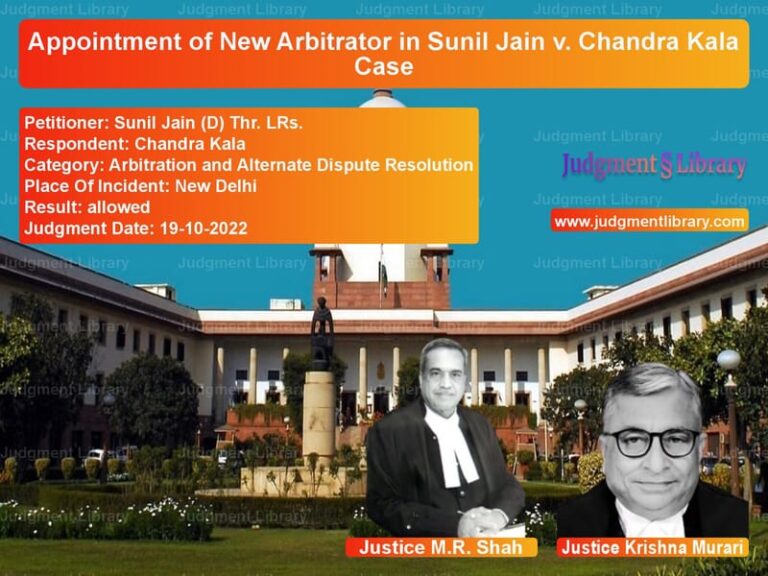Arbitration and Counterclaims: Supreme Court Allows NHAI’s Counterclaim
The case of National Highway Authority of India (NHAI) vs. Transstroy (India) Limited is a landmark judgment in the realm of arbitration law. The Supreme Court addressed the critical issue of whether counterclaims can be introduced in an arbitration proceeding even when procedural requirements, such as prior conciliation, have not been explicitly followed. This ruling has significant implications for construction contracts, dispute resolution, and the scope of arbitration agreements.
Background of the Case
The dispute originated from a contract between NHAI and Transstroy (India) Limited for an Engineering, Procurement, and Construction (EPC) agreement concerning a highway project in Tamil Nadu. The contract was terminated by NHAI due to alleged breaches by the contractor.
Following the termination, the contractor initiated arbitration proceedings, claiming damages from NHAI. NHAI, in its defense, sought to file a counterclaim for damages arising from the contractor’s failure to fulfill its contractual obligations. However, the Arbitral Tribunal and the Delhi High Court rejected NHAI’s counterclaim, leading to an appeal before the Supreme Court.
Petitioner’s (NHAI) Arguments
The counsel for NHAI, Ms. Madhavi Diwan, Additional Solicitor General, argued that:
- The contract termination and related damages formed a single dispute that should be adjudicated together.
- The counterclaim arose from the same transaction and should not be subject to a separate conciliation process.
- The rejection of the counterclaim would lead to multiplicity of proceedings and unnecessary litigation.
- The Arbitration Act, 1996, particularly Section 23(2A), permits counterclaims as long as they fall within the arbitration agreement.
- The Tribunal’s refusal to entertain the counterclaim violated the principles of natural justice.
Respondent’s (Transstroy India Ltd.) Arguments
The contractor’s counsel, Mr. Nakul Dewan, contended that:
- The arbitration clause in the EPC contract mandated that all disputes undergo an amicable resolution process before arbitration.
- NHAI failed to notify its counterclaim under the dispute resolution mechanism outlined in Clause 26 of the contract.
- Section 23(2A) of the Arbitration Act does not override contractual requirements for pre-arbitration conciliation.
- The contractor had specifically defined the scope of disputes in its arbitration notice, which did not include NHAI’s counterclaims.
Supreme Court’s Observations
The Supreme Court, comprising Justices M.R. Shah and Sanjiv Khanna, analyzed the relevant clauses of the contract and statutory provisions. The Court observed:
“The Arbitral Tribunal and the High Court have failed to appreciate the difference between the expressions ‘claim’, which may be made by one side, and ‘dispute’, which by its definition has two sides.”
Read also: https://judgmentlibrary.com/supreme-court-sentences-developer-for-contempt-in-real-estate-dispute/
Key findings of the Court:
- Scope of Arbitration: The contract’s dispute resolution mechanism did not prohibit counterclaims; rather, it provided a framework for resolving all disputes arising from the contract.
- Natural Justice: Denying NHAI the right to present its counterclaim violated the principles of fairness and equal treatment in arbitration.
- Multiplicity of Proceedings: Requiring NHAI to file a separate arbitration for its counterclaim would be inefficient and against the spirit of arbitration.
- Contractual Interpretation: The Court emphasized that procedural requirements should not be interpreted rigidly to frustrate substantive rights.
Final Ruling
The Supreme Court set aside the judgments of the Arbitral Tribunal and the Delhi High Court. The ruling concluded:
“The application submitted by NHAI to file the counterclaim is hereby allowed, and the Arbitral Tribunal is directed to consider it along with the Statement of Claim.”
The Court also excluded the period between July 18, 2017, to July 11, 2022 from the statutory time limits under Section 29A of the Arbitration Act, ensuring that NHAI would not be penalized for delays caused by the litigation.
Read also: https://judgmentlibrary.com/understanding-the-group-of-companies-doctrine-in-arbitration-law/
Key Takeaways
- Counterclaims in Arbitration: Even if a contract mandates conciliation before arbitration, counterclaims can still be entertained if they arise from the same transaction.
- Efficiency in Dispute Resolution: Multiplicity of proceedings should be avoided to ensure effective and timely justice.
- Fairness in Arbitration: Parties must be given equal opportunity to present their claims and defenses.
- Judicial Intervention: Courts can intervene when procedural rigidity unfairly prejudices a party’s substantive rights.
Conclusion
The judgment in National Highway Authority of India vs. Transstroy (India) Limited establishes a crucial precedent in arbitration law. It reinforces the principle that procedural requirements should not obstruct substantive justice. The ruling ensures that counterclaims arising from the same dispute are adjudicated efficiently, promoting the objectives of the Arbitration Act.
Petitioner Name: National Highway Authority of India.Respondent Name: Transstroy (India) Limited.Judgment By: Justice M.R. Shah, Justice Sanjiv Khanna.Place Of Incident: Tamil Nadu.Judgment Date: 11-07-2022.
Don’t miss out on the full details! Download the complete judgment in PDF format below and gain valuable insights instantly!
Download Judgment: national-highway-aut-vs-transstroy-(india)-l-supreme-court-of-india-judgment-dated-11-07-2022.pdf
Directly Download Judgment: Directly download this Judgment
See all petitions in Arbitration Act
See all petitions in Contract Disputes
See all petitions in Dispute Resolution Mechanisms
See all petitions in Enforcement of Awards
See all petitions in Commercial Arbitration
See all petitions in Judgment by Mukeshkumar Rasikbhai Shah
See all petitions in Judgment by Sanjiv Khanna
See all petitions in allowed
See all petitions in Remanded
See all petitions in supreme court of India judgments July 2022
See all petitions in 2022 judgments
See all posts in Arbitration and Alternate Dispute Resolution Category
See all allowed petitions in Arbitration and Alternate Dispute Resolution Category
See all Dismissed petitions in Arbitration and Alternate Dispute Resolution Category
See all partially allowed petitions in Arbitration and Alternate Dispute Resolution Category







